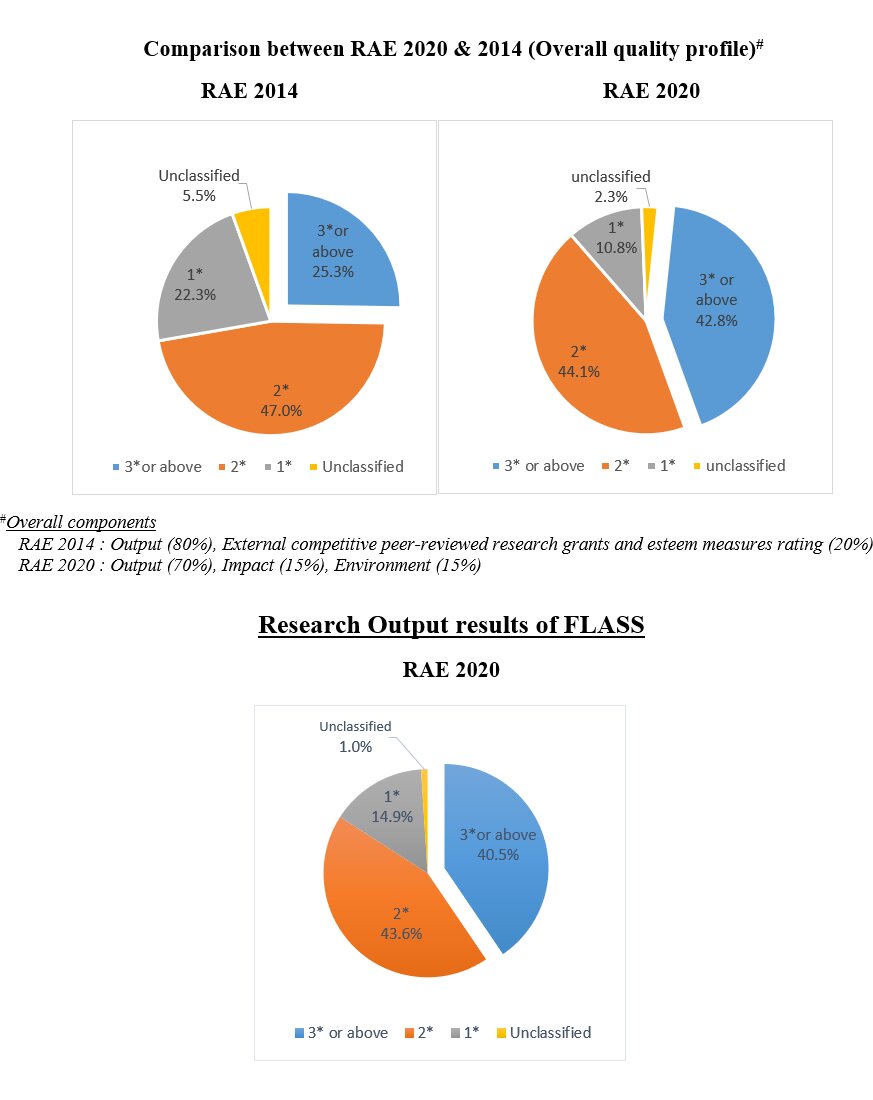博文及社会科学学院于「2020年研究评审工作」整体表现跃进
The Faculty of Liberal Arts and Social Sciences (FLASS) at The Education University of Hong Kong (EdUHK) may be in its youth, but the Research Assessment Exercise (RAE) 2020 results recently released by the University Grants Committee, have affirmed that the Faculty has made significant progress in enhancing the quality of its research and having a positive impact for the wider society.
Reflecting the University’s Education-plus vision, FLASS participated in nine Units of Assessment across the RAE panels of physical sciences; computer science / information technology; social sciences; creative arts, performaing arts & design; and education.
FLASS's overall performance in RAE 2020 improves significantly over 2014. In overall quality profile, the proportion rated at 3* (internationally excellent) and 4* (world-leading) increased to 42.8 per cent in 2020, from 25.3 per cent in 2014, while 86.9 per cent was assessed as of international standing and above, compared with 72.3 per cent in 2014. Meanwhile, 40.5 per cent of its research outputs were rated at 3* and above in this exercise.

EdUHK stands out for top performance in research impact in political science
The panel of international experts rated its two Impact Case Studies in this discipline, submitted by the Department of Asian and Policy Studies (APS) in FLASS, at 4*. No other university achieved a 100 per cent outstanding record for impact in this discpline.
For the RAE’s new measure of the societal impact of research, 20 per cent of FLASS’s 10 case studies across the nine units were rated as having “outstanding impact” (4*) and 30 per cent as having “considerable impact” (3*) in terms of their reach and significance.
Geography - Highest among four universities entered for the discipline
For geography, a small unit of seven academic staff members from Department of Social Sciences (SSC), Department of Science and Environmental Studies (SES), and Department of Asia and Policy Studies (APS), more than two thirds (67 per cent) of their research outputs were judged to be “world leading” or “internationally excellent”, the highest among the four universities entered for this discipline.
For earth sciences and other physical sciences (including environmental science) submitted by SES, the overall quality profile rated 3* or above increased from 23 per cent in RAE 2014 to 67 per cent, while for physical education, the Department of Health and Physical Education (HPE) achieved a 23 per cent improvement in its overall profile to 58 per cent at 3* or above.
For the research environment that underpins these achievements, three units of assessment (i.e. earth sciences, music & performing arts, and physical education) were rated as “an environment that is conducive to producing research of internationally excellent quality” and four as “an environment that is conducive to producing research of internationally recognised quality”, in terms of its vitality and sustainability. Some panels split their ratings, which meant that one unit (computer studies/science) was rated 62 per cent at internationally excellent quality and above. Another (mathematics and statistics) was rated internationally excellent quality (25 per cent) and internationally recognised quality (75 per cent).
FLASS continues to promote culture that produces research of both high academic quality and positive value to society
Professor Daniel Chow, Associate Dean (Research & Postgraduate Studies) at FLASS, was delighted with the progress made over the last six years. These results reflect the hard work and talent of our colleagues aross all our departments, as well as the increased strategic focus and support for research, at university, faculty and departmental levels to strengthen the research environment.
Professor Chow said that it was important to reflect on the results. “We can celebrate the progress but must scale up our achievements by further refining our strategy and support for scholarly research and its knowledge transfer. This should include building critical mass through greater collaboration, within the faculty, Hong Kong and the wider research community.
“We have been working systematically to identify, support and promote research that is making a difference, as well as to create platforms for gathering evidence of real societal change, and articulating the cases.
“We are firm in our resolve to further extend this effort, paving the way for further improvement in the next RAE,” Professor Chow added.



